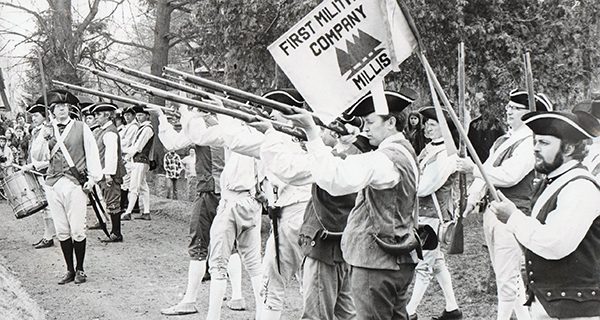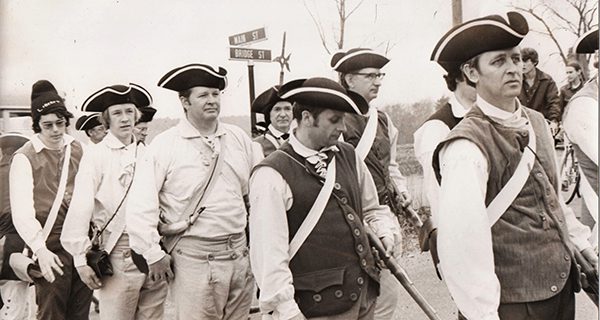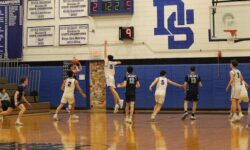[ccfic caption-text format="plaintext"]
This Old Town
by Richard DeSorgher
Medfield has always had a strong patriotic tie to Independence Day. It stems from the overwhelmingly patriotic spirit that was clearly evident here and seen from the first signs of troubles with Great Britain in the early 1770s. As early as 1773, when Bostonians were feeling their rights were being infringed, Medfield Town Meeting voted to support the cries of Samuel Adams and warn the British Government that “the Colonists have rights and the infringements of those rights are real.” The vote further stated that “Medfield stands ready to join with Boston or any other towns in any Constitutional measures for recovering, securing and defending our invaluable Rights and privileges, both civil and religious.”
In December of 1773, just two days before the Boston Tea Party, a Special Town Meeting was called where Medfield again joined with the Boston Committee of Correspondence in denouncing “the infringement of our rights by the British Parliament, especially the tax on tea.” They ended the vote by recording; “We remain united with our brethren in Boston in one common cause.”By 1774 the tone of the Medfield Town Meeting was even more defiant, as it instructed our Representative to the General Court “not to submit or yield obedience to any acts of the British Parliament that infringes upon our natural and charter rights.” Medfield then formed a Committee of Correspondence and sent delegates to the newly called Provincial Congress. Due to the crisis taking place, Medfield Town Meetings were being held on a weekly basis. The town then voted to double its stock of ammunition and raise tax revenue for that purpose. The November 21, 1774 Town Meeting passed a vote of compliance with the resolves adopted by the Continental Congress in Philadelphia and voted that the resolution be entered into the Medfield records. One hundred and fifty-three Medfield men signed their names to that resolution. The list, without exception, included the entire voting population of the town, showing there were evidently no Tories in Medfield. On December 26, Town Meeting voted to form a company of 25 Minute-Men. As a result of the destruction of the tea dumped into Boston Harbor and the closing of the Port of Boston under the Intolerable Acts, Medfield voted to send money and supplies to aid the Bostonians. From Medfield came 132 pounds of pork, 402 pounds of cheese and 22 cart loads of wood.
When actual fighting broke out in Lexington and Concord, the Medfield Minute-Men responded. In all, 82 men marched from this town. When the Bunker Hill alarm came, the Medfield men again responded, but did not arrive in time for the battle. Instead, they stayed and took part in the siege of Boston. Medfield men were sent by General George Washington to aid in the attack against Quebec. Medfield soldiers Samuel Cole, Jabez Boyden and Lemuel Thompson died outside Fort Ticonderoga. Each year, we filled our quotas of men from Medfield requested to serve in the Continental Army. We raised town taxes to pay for the war, including 40 shillings a month for each Medfield man enlisted into the Continental Army.
In the years following the war, the 4th of July here in Medfield was a much-celebrated, joyous day that featured the reading of the Declaration of Independence and an official town-wide celebration. Great enthusiasm took place. Special sermons related to American Independence were given in the churches. The military of Medfield (all those between 18 and 45 were obliged to serve in those days) paraded through the streets of the town, headed by the local musicians with fifes and drums. There would be the orator of the day giving a patriotic speech. The clergy and town officials would also speak. In those early years, at the conclusion of the celebrations, all would head over to the Johnson Tavern, located where Town Hall is located today, to sit down for a dinner. Toasts were given and after each toast a cannon, located outside the tavern, would be fired. The musicians would play, and all the guests would respond by drinking a glass of wine for each toast. In most cases, there were up to 20 toasts given. It was by all accounts a lively 4th of July.
In the 1880s, Medfield celebrated Independence Day with firework displays on the Pfaff Lot (site of today’s Pfaff Center and Dale Street School) with patriotic music played by the Medfield Brass Band. In the 1920s, Fourth of July celebrations featured a midnight bonfire and a parade of “horribles” through the main streets of the town. During this period, Fourth of July celebrations also featured a baseball game. Some years, the games were between the married and single men in the town, and some years between the town team and the state hospital employee team.
In more recent times, Medfield has lost much of its official celebration, with so many in the town leaving to go on vacation and celebrate at locations ranging from the beaches of the Cape to the lakes of northern New England. In the 1930s and 1940s, long-time resident Edie O’Toole remembers a lawn party taking place the night before the 4th outside the Congregational Church (now the UCC Church) where refreshments and hot dogs were served. The youth of the town often got carried away in celebrating and used the 4th of July celebrations to burn vacant buildings or push burning wagons filled with hay through the town center. The Medfield Drum and Bugle Corps performed at the State Hospital on the 4th of July with a parade enjoyed by the hospital residents.
In the late 1930s Alexander and Marguerite Allan bought Ord’s Block, where Avenue Restaurant is located today, and opened The Paper Store. The Paper Store sold stationary, candy, wallets, magazines, tobacco products, newspapers, etc. At the time, fireworks were legal in Massachusetts and during the 4th of July, The Paper Store attached a small shack to the Main Street side of the building. Here, fireworks, sparklers, cherry bombs, etc were sold for the locals to celebrate our nation’s independence.
From the 1950s until today, most Medfield residents go out of town to view a number of firework displays including those in Walpole, Needham and Franklin. Today, there is no official town celebration. MEMO places the American flags along the telephone poles in the center of town. Town residents put flags of all sizes outside or attached to their homes. By and large, however, a sizable percent of the population leaves Medfield during the 4th of July.
Active celebration or not, the Town of Medfield has a proud and patriotic history concerning America’s independence; it played an important role about which all town residents can be proud.











